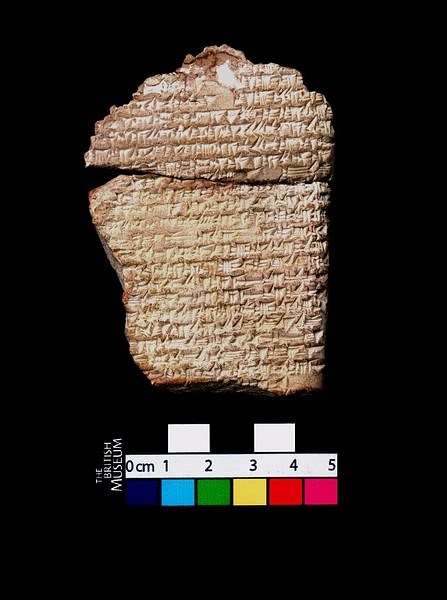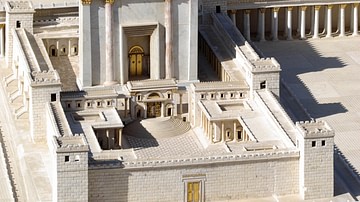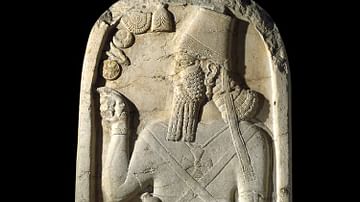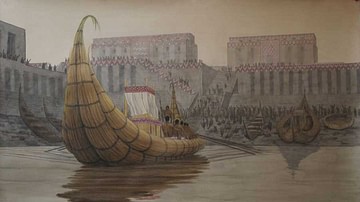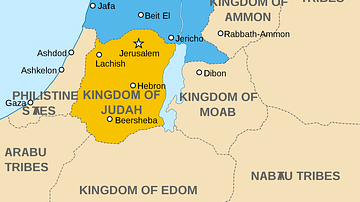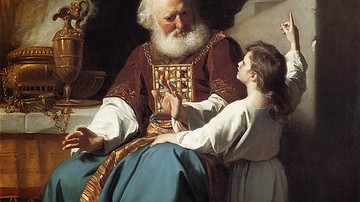The Myth of Adapa (also known as Adapa and the Food of Life) is the Mesopotamian story of the Fall of Man in that it explains why human beings are mortal. The god of wisdom, Ea, creates the first man, Adapa, and endows him with great intelligence and wisdom but not with immortality, and when immortality is offered Adapa by the great god Anu, Ea tricks Adapa into refusing the gift.
Though it is not expressed directly in the myth, Ea's reasoning in this seems similar to Yahweh's in the Genesis story from the Bible where, after Adam and Eve are cursed for eating of the Tree of the Knowledge of Good and Evil, Yahweh casts them out before they can also eat of the Tree of Life:
Behold, the man is become as one of us, to know good and evil; and now, lest he put forth his hand and take also of the tree of life, and eat, and live forever; Therefore the Lord God sent him forth from the garden of Eden. (Genesis 3:22-23)
If Adam and Eve were immortal they would be on par with Yahweh and there would be a loss of status for the god; and this is Ea's same reasoning in the Adapa myth. In the Genesis myth, man takes knowledge for himself by eating of the tree; in the Mesopotamian myth, the god Ea grants man knowledge in the process of creation. Knowing that Adapa is already wise, Ea (like Yahweh in the later story from Genesis) needs to keep the man in his place.
Summary
Adapa was the king of the city of Eridu and, the myth tells us, went fishing one day in the Persian Gulf when the south wind suddenly capsized his boat and hurled him into the sea. Furious at this, Adapa broke the wing of the south wind and for seven days the wind could not blow. The sky god Anu is angered by this and sends for Adapa to explain himself. Adapa receives counsel from Ea on how he should behave in the court of the gods. As Ea is Adapa's father-god and creator, Adapa trusts him to tell him the truth. But Ea fears that Anu is apt to offer Adapa the food and drink of eternal life and Ea is intent on making sure that Adapa does not accept the offer.
First Ea tells him that he should flatter the guardians of the gates, Tammuz and Gishida (two dying and reviving deities) by making it known that he remembers them, that he knows who they are. If Adapa does this then the guardians will let him pass without difficulty and will speak favorably of him to Anu. Once Adapa is in the presence of Anu, Ea further tells him, he should refuse any food or drink offered because it will be the food of death and the drink of death which will be offered as punishment for Adapa breaking the wing of the south wind. However, Ea says, Adapa may accept oil to anoint himself and accept whatever clothing is offered.
Adapa does exactly as Ea suggests, respectfully honoring Tammuz and Gishida and refusing the food and drink offered by Anu (though anointing himself and accepting a robe). Anu, puzzled that the man should refuse the food and drink of life and the gift of immortality, sends Adapa back to earth where he must live out his life as a mortal. The tale would seem to conclude with Anu punishing Ea for deceiving Adapa, but as the third tablet is fragmentary, it is difficult to say with certainty.
An alternative interpretation of the myth claims that Ea is sincerely acting in the best interests of Adapa when he warns him against accepting food or drink from Anu because Ea earnestly believes that Anu will punish Adapa with death for breaking the wing of the south wind. This interpretation claims that Ea's punishment at the end of the poem is not for deceiving Adapa but for warning him against Anu's plans. Nowhere in the poem, however, does it state that Anu planned to kill Adapa, only that he was upset that the south wind was not blowing (that life on earth was not functioning as it should) and wanted Adapa to explain himself.
The poem makes more sense when understood as Ea deceiving Adapa to keep immortality from human beings and Anu punishing Ea for this deception. Anu, upon hearing Adapa's explanation for his action, asks, "Why has Ea revealed to impure mankind/The heart of heaven and earth?" This response seems to indicate that Anu respects Adapa's answer and is impressed by it but wonders why Ea should have made Adapa so intelligent yet denied him eternal life. It is directly after Anu asks this question and "What can we do with him?" that he orders the food and water of eternal life be brought to Adapa. Anu wishes to correct Ea's mistake and grant Adapa eternal life and seems genuinely puzzled when Adapa refuses his hospitality. Anu is attempting to pre-empt the fundamental question which human beings have asked through the ages, "Why should I be born to die and, knowing I will die, what is the point of living?", by granting immortality; but this is not to be.
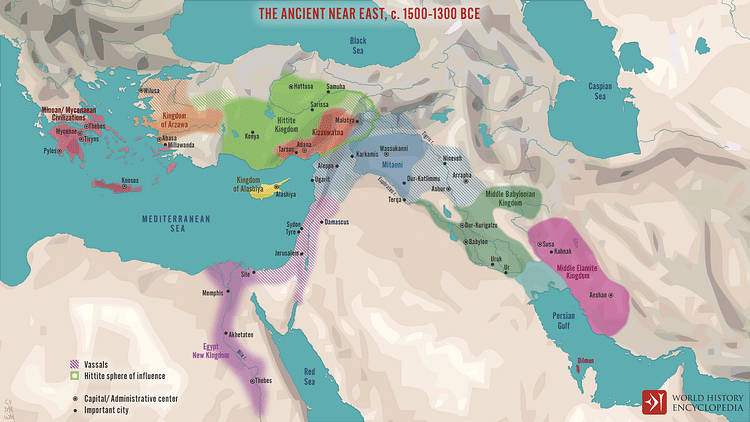
The myth comes from the Babylonian Kassite period of the 14th century BCE (when the Kassite tribe ruled in Babylon). The 3rd century BCE writer Berossus called Adapa "Oannes" and described him as a fish-man who lived in the Persian Gulf and taught wisdom and civilization to human beings. Berossus was following the tradition of Adapa as one of the Abgal (or Apkallu) the seven sage demi-gods who gave civilization to human beings in the ancient days before the Great Flood. In The Myth of Adapa, however, the central character is depicted as a wise king who is duped by a god, not as a demi-god himself.
The Text
The following translation of the myth is by Robert W. Rogers from his 1912 work, Cuneiform Parallels to the Old Testament:
THE FIRST TABLET:
He [Adapa] possessed intelligence ...
His command like the command of Anu ...
He [the god Ea] granted him a wide ear to reveal the destiny of the land,
He granted him wisdom, but he did not grant him eternal life.
In those days, in those years the wise man of Eridu,
Ea had created him as chief among men,
A wise man whose command none should oppose,
The prudent, the most wise among the Anunnaki was he,
Blameless, of clean hands, anointed, observer of the divine statutes,
With the bakers he made bread
With the bakers of Eridu, he made bread,
The food and the water for Eridu he made daily,
With his clean hands he prepared the table,
And without him the table was not cleared.
The ship he steered, fishing and hunting for Eridu he did.
Then Adapa of Eridu
While Ea, ... in the chamber, upon the bed.
Daily the closing of Eridu he attended to.
Upon the pure dam, the new moon dam) he embarked upon the ship,
The wind blew and his ship departed, With the oar, be steered his ship Upon the broad sea . . .
THE SECOND TABLET:
The south wind ... when
He had driven me to the house of my lord, I said,
O South Wind, on the way I shall to thee ... everything that,
Thy wing, will I break." As he spoke with his mouth,
The wing of the South Wind was broken, seven days
The South Wind blew not upon the land. Anu
Called to his messenger Ilabrat:
Why has the South Wind not blown upon the land for seven days?
His messenger Ilabrat answered him: "My lord,
Adapa, the son of Ea, the wing of the South Wind
Has broken."
When Anu heard these words
He cried,"Help!" He ascended his throne,
"Let some one bring him,"
Likewise Ea, who knows the heaven. He roused him
... he caused him to wear. With a mourning garment
He garbed him, and gave him counsel
Saying: "Adapa, before the face of Anu the King thou art to go
... to heaven
When thou comest up, and when thou approachest the door of Anu,
At the door of Anu, Tammuz and Gishzida are standing,
they will see thee, they will ask thee; 'Sir,'
For whose sake dost thou so appear, Adapa? For whom
Art thou clad in a mourning garment?' 'In our country two gods have vanished, therefore
Am I so.' 'Who are the two gods, who in the land
Have vanished?' 'Tammuz and Gishzida.' They will look at one another and
Be astonished. Good words
They will speak to Anu. A good countenance of Anu
They will show thee. When thou standest before Anu
Food of death they will set before thee,
Eat not. Water of death they will set before thee,
Drink not. Garments they will set before thee,
Put them on. Oil they will set before thee, anoint thyself.
The counsel that I have given thee, forget not. The words
Which I have spoken, hold fast." The messenger
Of Anu came: "Adapa has broken
The wing of the South Wind. Bring him before me."
The road to Heaven he made him take, and to Heaven he ascended.
When he came to Heaven, when he approached the door of Anu,
At the door of Anu, Tammuz and Gishida are standing.
When they saw him, Adapa, they cried: "Help,
Sir, for whom dost thou so appear? Adapa,
For whom art thou clad in a mourning garment?"
"In the country two gods have vanished; therefore am I clad
In mourning garments." "Who are the two gods, who
have vanished from the land?"
"Tammuz and Gishzida." They looked at one another and
Were astonished. When Adapa before Anu, the King,
Drew near, and Anu saw him, he cried:
"Come hither, Adapa. Why hast thou broken the wings
Of the South Wind?" Adapa answered Anu: "My lord,
For the house of my lord in the midst of the sea,
I was catching fish. The sea was like a mirror,
The South Wind blew, and capsized me.
To the house of my lord was I driven. In the anger of my heart,
I took heed." Tammuz and Gishzida
Answered ... "art thou." To Anu
They speak. He calmed himself, his heart was ...
"Why has Ea revealed to impure mankind
The heart of heaven and earth? A heart
... has created within him, has made him a name?
What can we do with him? Food of life
Bring him, that he may eat." Food of life
They brought him, but he ate not. Water of life
They brought him, but he drank not. Garments
They brought him. He clothed himself. Oil
They brought him. He anointed himself.
Anu looked at him; he wondered at him.
" Come, Adapa, why hast thou not eaten, not drunken?
Now thou shalt not live." ... men ...Ea, my lord
Said: "Eat not, drink not."
Take him and bring him back to his earth.
... looked upon him.
THE THIRD TABLET
When [Anu] heard that
In the anger of his heart
His messenger he sent.
He who knows the heart of the great gods
...
To King Ea to come,
To him, he caused words to be borne.
... to him, to King Ea.
He sent a messenger
With a wide ear, knowing the heart of the great gods,
... of the heavens be fixed.
A soiled garment he made him wear,
With a mourning garment he clad him,
A word he spoke to him.
"Adapa, before the King Anu thou shalt go
Fail not the order, keep my word
When thou comest up to heaven, and approachest the door of Anu,
Tammuz and Gishzida at the door of Anu are standing.
